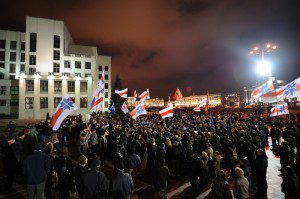Index relies entirely on the support of donors and readers to do its work.
Help us keep amplifying censored voices today.

Opposition protesters in Minsk in 2010. Kseniya Avimova | Demotix
Europe’s last dictatorship plans even tighter controls over citizens’ access to the digital world, Index shows in a new report (more…)
Europe’s last dictatorship uses violence, repressive legislation and economic discrimination to silence independent journalists. Yanina Melnikava reports
(more…)
Indian intellectual Ashis Nandy is facing a police investigation after remarks about underprivileged people made at the Jaipur Literary Festival. Nandy was quoted as saying that “Most corrupt people come from Other Backward Classes, scheduled castes and scheduled tribes.” Nandy later claimed that he had meant that most people prosecuted for corruption were from the lower castes, as they did not have the means to defend themselves. But complaints have reportedly been made to police.
Writers including novelist Hari Kunzru were threatened with prosecution at the Jaipur festival last year after they read extracts from the work of Salman Rushdie, who had been forced to withdraw from appearing at the event following threats.
Belarusian journalist Irina Khalip is to apply to leave the country to visit the UK and Russia. Khalip, who is married to former presidential candidate Andrei Sannikov, is currently subject to a two-year suspended sentence, handed down after a crackdown on opposition journalists and activists in the wake of Belarus’s 2010 presidential election. Her husband has been granted asylum in the UK.
Egypt’s Prosecutor General has ordered the arrest of all members of alleged anarchist group “Black Bloc”.
The newly-emerged Black Bloc, adopting tactics from international anarchist protest movements, and wearing distinctive black hoodies and balaclavas, has been denounced as “barbaric” by Muslim Brotherhood-aligned media. But some commentators have likened the crackdown on the tiny grouping to a panic over heavy metal fans during the Mubarak era.
Philippines Solicitor-General Francis Jardeleza has said that “liking” a libelous post on Facebook could lead to criminal prosecution.
Jardazela’s addmission, during a discussion on the Philippines cybercrime law, prompted one Supreme Court judge to admit that he would now be “reluctant to express [his] view on the web.
On the second anniversary of the Minsk protests, Index calls for the immediate release of all political prisoners in Belarus (more…)